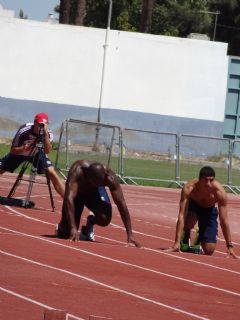Whilst teams like cycling & rowing have lived up to their pre-Game billing & others such as boxing, judo, canoe slalom & the equestrian events have exceeded what few out with those teams were predicting, there will be some governing bodies taking a long hard look in the mirror. It has been suggested that swimming underachieved & may be sailing hasn't enjoyed quite the magnitude of success that was being predicted. As for athletics, well, we will have to wait & see if the gold rush on "Super Saturday" is maintained throughout the rest of the programme.
So what makes the difference? Why are some teams lifting the nation on their shoulders, whilst others, still receiving considerable financial support in comparison to their international counterparts, are struggling? Reading the articles, listening to the interviews & speaking to people from various performance environments, there are themes emerging that illustrate a link between the organisations enjoying the major dominance.
Cycling & rowing are lead by management teams with clear strategies in place, underpinned by solid structures comprised of systems & people that, whilst being very accomplished, are also not afraid to reflect on their practice in a very analytical & critical manner. This security in their own ability enables them to scrutinise every aspect of practice & ask "what can we do better?" & "how can we work with the people we have (or in certain instances, those we need to bring in), to support them & in turn help them achieve more individually, so that as a team we achieve more collectively?".
These teams have not been afraid to question their own practice nor have they been afraid to question the established practices of others in their specific sport & as a result have challenged themselves to look at how other sports or professions have achieved excellence.
The video below was recorded by SkySports in 2009 & whilst some of the staff interviewed have since moved on, the ethos remains the same.
It strikes me that these teams do not entertain "jobs for the boys", unless the boys are the best; they do not suggest "it'll do", despite the fact that contemplating, then incorporating a necessary change may be an uncomfortable experience & they do not ignore existing problems because "now is not the most convenient time to confront them". So, should we?
An article published yesterday on the BBC website, discusses the specific case of the British Cycling Team & is well worth a read:
The unfortunate reality of achieving such dominance in a sport, is that others continuing to do the same things they have always done, don't achieve anything other than the results they have always achieved & subsequently start to point the finger of accusation, suggesting that the awesome heights the nouveau elite are reaching must be the result of skull-duggery & dishonest means. The French & Australians, themselves having recently enjoyed windows of sporting dominance, have been quick to sling mud as opposed to partaking in a spot of introspection & asking the same tough questions Dave Brailsford has asked of his team.
The irony is that to achieve the successes both France & Australia achieved throughout the last decade, their organisations were headed up by like minded individuals. However, the reallocation of public money to projects away from sport has meant that instead of continuing to push the envelope, their sporting establishments have started to tread water, which in comparative terms has ensured they have slipped back down the field. To this end the Australians have already ordered an internal investigation into their swimming programme. Let's hope the current British government & British governments to come look at these examples & adopt a different path.
What we as practitioners & coaches working in elite sport must do, is take a leaf out of Dave Brailsford's rather well-written book & ask the same question..."if we look at every aspect of our practice & improve it by 1%, what gains could we make when we add all those improvements together". We need to be less insecure, acknowledge what others both within as well as outside of our sports do & challenge our established mindsets.
Let's not be the ones to fall into the trap of falling behind by not moving forward, let's not be frightened of what we could achieve if we dared to challenge ourselves, let's not opt for comfort & security - let's take ourselves by the scruff of our necks, be inspired by Sir Chris Hoy, Bradley Wiggins, Mark Cavendish, Victoria Pendleton & Laura Trott....let's dominate!!!

